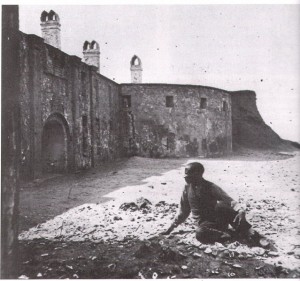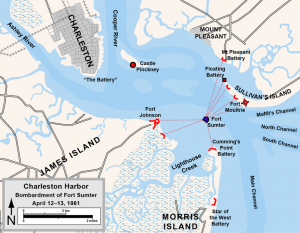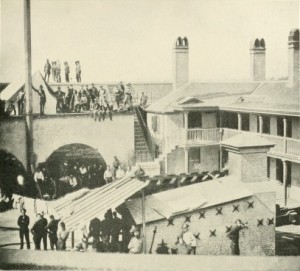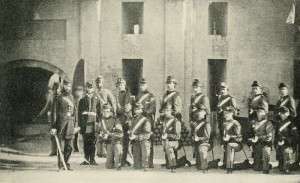From The New-York Times September 30, 1861:
Our Soldiers Imprisoned at Castle Pinckney.
To the Editor of the New-York Times:
Again our wounded prisoners have been subjected to a painful and weary journey from Richmond to Castle Pinckney, and again the question is raised in the hearts of those nearly interested in their fate, Will there be an exchange of prisoners? If so, why delay, when every day and every hour is dragging heavily — taking strength and vital energy, and leaving exhaustion and death to follow as the result of long confinement and meagre fare. Our daily papers already begin to tell the sad tale.
When we read of the cruelties practiced upon our wounded men by the rebels at Bull Run, we shuddered that such barbarism should darken the page of history. But, if true, horrible as it was, the pang was short. A soldier died like a hero, with his martial cloak around him, with a comrade, perhaps, to carry back his dying words, and the blue canopy of Heaven above opening its wide arms to receive him. But, alas! for our poor prisoners — death comes less graciously to them. It seeks them in the form of insinuating disease, and finds them with hunger gnawing at their vitals, in close, crowded rooms, whose poisoned atmosphere is slowly sapping away their strength hour by hour, until they sink away, unseen, unknowing and unknown.
This is no highly colored picture, but absolute fact, as told by an occasional letter from an officer in Richmond. Our officers are all confined in one room, and our wounded languishing in hospitals with miserable fare, which, in neither quantity or quality, affords the nourishment they absolutely require.
Has the Administration so fully resolved upon its policy, in regard to prisoners, as that they are to permit them to remain for slow disease to destroy, lest an exchange would be to recognise the war as other than a rebellion? That it is a rebellion of most gigantic proportions, all will acknowledge; but allowing that, what precedent is there in civilized warfare for nonexchange of prisoners? Our forefathers rebelled against England, and yet the history of the Revolution records various instances of the exchange of prisoners. The following tariff was arranged in 1779: A sergeant was reckoned equal to two privates; first lieutenant to six; captain, 16; major, 28; lieutenant-colonel, 72; colonel, 200; major-general, 372; lieutenant-general, 1,044; adjutant and quartermaster, 6; surgeons, 6; surgeons of hospitals, 16; deputies and assistants, 6; and all others of the staff, according to the rank they held in the line. If, then, such a tariff was made and acted upon, why do we now, who, as a nation, pride ourselves on our civilization, permit our prisoners to suffer and die without a word of remonstrance?
This is no common war. We have no common warriors. Our privates are not hirelings, but in many instances cultivated men, who have left homes of luxury for a soldier’s fare and fate, and, alas! many of them to pine under Southern suns, so cut off from home and friends, that life itself departs unheralded. In some instances a wife has been left with little children, entirely dependant upon the charity of friends, without the least assistance from Government, and these the families of officers high in rank. Is it right that they should receive nothing from a Government whose peculiar policy prevents the prisoner from supporting them? It cannot be that; this policy is fully resolved upon. It will not be if the “powers that be” will but listen to the cries and prayers which go up momentarily from the hospitals and prisons of Richmond, and are reechoed all over the land in the heart of every lover of
NEW-YORK, Sept. 29, 1861. HUMANITY.
The journey from Richmond to Castle Pinckney might have been painful for the selected First Bull Run prisoners, but as it turns out it was one of the better Civil War prison experiences. It appears that the prisoners were transferred elsewhere by the end of 1861. You can read a time-line of Castle Pinckney’s history (until 1992) at SC State Ports Authority, including this from 1861:
Prisoners form “The Castle Pinckney Brotherhood” which established a pattern for living, including rules for cleanliness and provisions for entertainment. The Charleston Zouaves helped in the brotherhood’s activities. The prisoners performed volunteer work of various kinds. There was no record of escape from Castle Pinckney.
The map of Charleston harbor by Hal Jespersen is licensed by Creative Commons.




